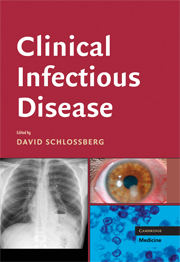Book contents
- Frontmatter
- Contents
- Preface
- Contributors
- Part I Clinical Syndromes – General
- Part II Clinical Syndromes – Head and Neck
- Part III Clinical Syndromes – Eye
- Part IV Clinical Syndromes – Skin and Lymph Nodes
- 17 Fever and Rash
- 18 Staphylococcal and Streptococcal Toxic Shock and Kawasaki Syndromes
- 19 Classic Viral Exanthems
- 20 Skin Ulcer and Pyoderma
- 21 Cellulitis and Erysipelas
- 22 Deep Soft-Tissue Infections: Necrotizing Fasciitis and Gas Gangrene
- 23 Human and Animal Bites
- 24 Lice, Scabies, and Myiasis
- 25 Superficial Fungal Diseases of the Hair, Skin, and Nails
- 26 Mycetoma (Madura Foot)
- 27 Fever and Lymphadenopathy
- Part V Clinical Syndromes – Respiratory Tract
- Part VI Clinical Syndromes – Heart and Blood Vessels
- Part VII Clinical Syndromes – Gastrointestinal Tract, Liver, and Abdomen
- Part VIII Clinical Syndromes – Genitourinary Tract
- Part IX Clinical Syndromes – Musculoskeletal System
- Part X Clinical Syndromes – Neurologic System
- Part XI The Susceptible Host
- Part XII HIV
- Part XIII Nosocomial Infection
- Part XIV Infections Related to Surgery and Trauma
- Part XV Prevention of Infection
- Part XVI Travel and Recreation
- Part XVII Bioterrorism
- Part XVIII Specific Organisms – Bacteria
- Part XIX Specific Organisms – Spirochetes
- Part XX Specific Organisms – Mycoplasma and Chlamydia
- Part XXI Specific Organisms – Rickettsia, Ehrlichia, and Anaplasma
- Part XXII Specific Organisms – Fungi
- Part XXIII Specific Organisms – Viruses
- Part XXIV Specific Organisms – Parasites
- Part XXV Antimicrobial Therapy – General Considerations
- Index
18 - Staphylococcal and Streptococcal Toxic Shock and Kawasaki Syndromes
from Part IV - Clinical Syndromes – Skin and Lymph Nodes
Published online by Cambridge University Press: 05 March 2013
- Frontmatter
- Contents
- Preface
- Contributors
- Part I Clinical Syndromes – General
- Part II Clinical Syndromes – Head and Neck
- Part III Clinical Syndromes – Eye
- Part IV Clinical Syndromes – Skin and Lymph Nodes
- 17 Fever and Rash
- 18 Staphylococcal and Streptococcal Toxic Shock and Kawasaki Syndromes
- 19 Classic Viral Exanthems
- 20 Skin Ulcer and Pyoderma
- 21 Cellulitis and Erysipelas
- 22 Deep Soft-Tissue Infections: Necrotizing Fasciitis and Gas Gangrene
- 23 Human and Animal Bites
- 24 Lice, Scabies, and Myiasis
- 25 Superficial Fungal Diseases of the Hair, Skin, and Nails
- 26 Mycetoma (Madura Foot)
- 27 Fever and Lymphadenopathy
- Part V Clinical Syndromes – Respiratory Tract
- Part VI Clinical Syndromes – Heart and Blood Vessels
- Part VII Clinical Syndromes – Gastrointestinal Tract, Liver, and Abdomen
- Part VIII Clinical Syndromes – Genitourinary Tract
- Part IX Clinical Syndromes – Musculoskeletal System
- Part X Clinical Syndromes – Neurologic System
- Part XI The Susceptible Host
- Part XII HIV
- Part XIII Nosocomial Infection
- Part XIV Infections Related to Surgery and Trauma
- Part XV Prevention of Infection
- Part XVI Travel and Recreation
- Part XVII Bioterrorism
- Part XVIII Specific Organisms – Bacteria
- Part XIX Specific Organisms – Spirochetes
- Part XX Specific Organisms – Mycoplasma and Chlamydia
- Part XXI Specific Organisms – Rickettsia, Ehrlichia, and Anaplasma
- Part XXII Specific Organisms – Fungi
- Part XXIII Specific Organisms – Viruses
- Part XXIV Specific Organisms – Parasites
- Part XXV Antimicrobial Therapy – General Considerations
- Index
Summary
TOXIC SHOCK SYNDROME
Staphylococcal and streptococcal toxic shock syndromes (TSS) are acute-onset multiorgan illnesses defined by the criteria listed in Tables 18.1 and 18.2. Staphylococcal TSS is caused by Staphylococcus aureus strains that make pyrogenic toxin superantigens (PTSAgs); coagulase-negative strains do not make the causative toxins. Streptococcal TSS is caused mainly by toxin-producing group A strains but occasionally by groups B, C, F, and G strains. Several subsets of staphylococcal TSS exist, with two major categories being menstrual and nonmenstrual.
Menstrual TSS (Figure 18.1), which occurs within a day or two of and during menstruation, primarily has been associated with use of certain tampons, notably those of high absorbency, and is associated with production of TSS toxin-1 (TSST-1) by the causative bacterium. Three theories have been proposed to explain the role of tampons in menstrual TSS: (1) Tampons introduce oxygen, which is required for production of TSST-1, into the vagina; (2) tampons bind magnesium, which alters growth kinetics of S. aureus and thus alters the time when TSST-1 is made; and (3) pluronic L-92, a surfactant present in the Rely tampon, which was highly associated with TSS, amplifies production of TSST-1. Certain other surfactants may have similar effects.
Nonmenstrual TSS occurs in both males and females, adults and children, and it is associated with S. aureus strains that make TSST-1 or staphylococcal enterotoxins, notably enterotoxin serotypes B and C. The illness occurs in association with nearly any kind of staphylococcal infection, but major forms have been identified: postsurgical, influenza associated, RED syndrome (see below), and occasionally with use of contraceptive diaphragms.
- Type
- Chapter
- Information
- Clinical Infectious Disease , pp. 129 - 134Publisher: Cambridge University PressPrint publication year: 2008
- 1
- Cited by



